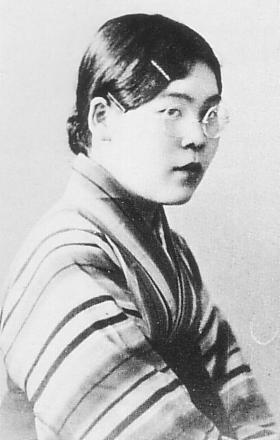More languages
More actions
 | This article is a stub. You can help improve this article by editing it. |
Teru Hasegawa Verda Majo 長谷川テル | |
|---|---|
 | |
| Born | March 7, 1912 Tokyo, Japan |
| Died | January 10, 1947 (aged 34)
[1] Republic of China |
Teru Hasegawa (Japanese: 長谷川テル, Hasegawa Teru) was a Japanese anti-fascist feminist Esperantist. She was also known by her Esperanto name Verda Majo ("Green May").
History[edit | edit source]
Esperanto[edit | edit source]
While in Japan, Majo had become acquainted with Esperantist circles. There was a close symbiosis at the time between a part of the Japanese Esperanto-movement and the movement for proletarian literature. In 1932 she was briefly taken into custody, being suspected of having "leftist sympathies", and was thereupon expelled from college. Thus, she returned to Tokyo, where she started to learn typewriting and fully committed herself to propagating proletarian Esperantist literature, especially amongst women.[2]
Escape to China[edit | edit source]
Via these activities she came into contact with the editor of the Chinese Esperanto magazine La Mondo (The World) in Shanghai at that time, which was looking among the Japanese Esperantists for someone to write an article about the situation of Japanese women. Majo published an article in the March/April issue 1935 focusing on the Japanese Women’s Movement and the question of labour and the suppression of the women's movement by Japanese fascism.
Eventually, Majo went to China after marrying Liu Ren, a Chinese Esperantist. She followed him and was helped by Liu's frends. As a result, one of his friends was arrested by the japanese police under the accusation of “having helped a representative of the Japanese Esperantists participate in an all-Chinese Esperanto congress, directed by the Comintern”.[3]
While in China she worked with other Chinese Esperantists, and eventually she became a Japanese language broadcaster with the Central Radio Station, broadcasting programs aimed at dividing the Japanese army. In July 1940, the Anti-war Revolution League of Japanese in China was founded and Majo was elected as one of its leaders. Majo died of an illness on January 10, 1947 at the age of 35.
Legacy[edit | edit source]
Zhou Enlai once said of Majo that she was "a sincere comrade-in-arms of the Chinese people."[4][2]
See also[edit | edit source]
Further Reading[edit | edit source]
- "Verda Majo – A Sincere Friend Dedicated to China" (2005-11-18).
- Gotelind Müller (2013). Hasegawa Teru alias Verda Majo (1912-1947) A Japanese woman Esperantist in the Chinese Anti-Japanese WAR OF Resistance (German: Hasegawa Teru alias Verda Majo (1912-1947). Eine japanische Esperantistin im chinesischen anti-japanischen Widerstand). [PDF] Heidelberg. (Anti-communist.)
Works[edit | edit source]
- Verda Majo (1982). Works of Verda Majo (Esperanto: Verkoj de Verda Majo). [PDF] Ĉina Esperanto-Eldonejo.
References[edit | edit source]
- ↑ Concise History of the Chinese Esperanto Movement (Esperanto: Konciza Historio de la Ĉina Esperanto-movado) (p. 60).
- ↑ 2.0 2.1 Gotelind Müller (2013). "Hasegawa Teru Alias Verda Majo (1912-1947): A Japanese woman esperantist in the Chinese anti-Japanese war of resistance" (PDF). University of Heidelberg.
- ↑ “Oni pretekstis, ke ili klopodis por sendi reprezentantondejapanaj esperantistoj al “Tutĉinia Esperantista Kongreso okazigita sub indiko de Kominterno** en Moskvo”, tio estas la supredirita jubileo.”
In China Battling: 'Sub Verda Stelo' (Esperanto: En Ĉinio batalanta) (p. 42). Works by Verda Majo. - ↑ “Verda Majo – a Sincere Friend Dedicated to China.” 2023. China.org.cn. Archived 2021-10-07.
